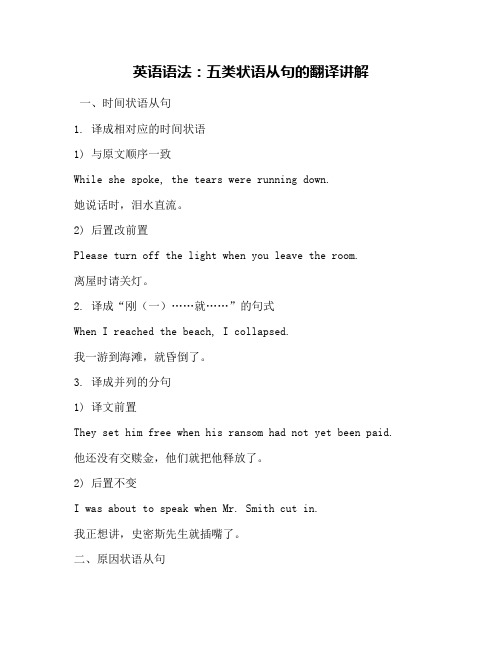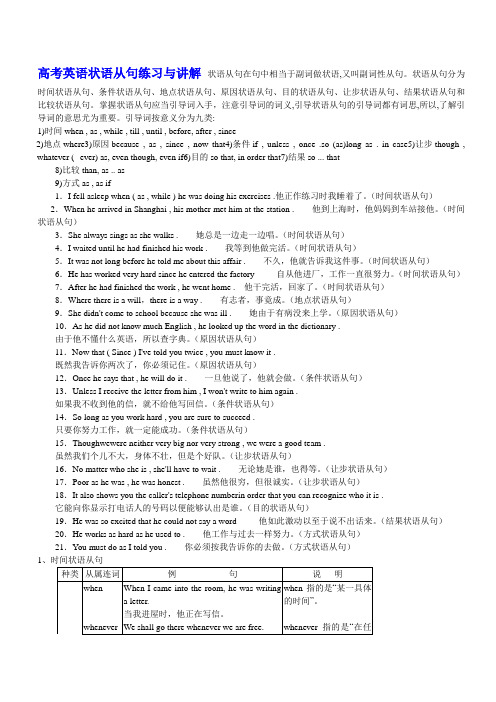高中英语语法条件状语从句讲解
高中英语状语从句用法详细解析

高中英语状语从句用法详细解析之五兆芳芳创作一、定义:在句中作状语的从句是状语从句,修饰主句中的动词、形容词或副词等.状语从句由从属连词引导,从属连词在句中不充当句子成分,只起连接作用,状语从句放在句首时,要用逗号,放在句尾时不必.二、分类按照意义上的不合,状语从句可分为:①时间状语从句②地点状语从句③原因状语从句④目的状语从句⑤条件状语从句⑥结果状语从句⑦让步状语从句⑧方法状语从句⑨比较状语从句三、时间状语从句(一)引导时间状语从句的连词有:as, when(whenever), before, after, as soon as,until(till), since, every time, once.(二)、“as” as, when, while都有“当……的时候”,可以互用When she was a child.While she was a child. She Lived in Paris.As she was a child.as有“一边…一边”的意思He sang as he walked.“when” When the clock struck twelve, all the lights went out.I was sleeping when she came in. 动补When we arrived at the station, the train had left.“while” 主、从句动作或状态同时产生.用while引导的从句用延续性动词,常暗示较长的时间或一个进程.While we were having supper, all the lights went out.Please keep quiet while others are studying.While I was writing letters last night, he was watching TV. when, while并列连问.when和while都可用作并列连问,连接并列分句.When暗示“就在……的时候”, while意反而,可是,暗示转折.One evening Beethoven was walking in a street, when he suddenly stopped outside a little house.并列连词引导并列句,意思是就在那时.(三)、主句是一般未来时,时间状语从句用一般现在时表未来,主句是过来未来时,从句用一般过来时暗示过来未来时,主句是一般过来时,从句用一般过来时.1. I' ll call you when I get there.2. They said they would leave when they got the new.3. They left as soon as they got the new.Whenever 无论什么时候,随时1. Whenever someone throws in some rubbish, the truck produces a piece of music.每当有人扔进一些垃圾时,它(汽车)就放一段音乐.2. Whenever we' re in trouble, they will help us.3. I go to the theatre, whenever I am free.4. Come and see me whenever you want to.你随时来看我.till和until(暗示“直到……”)句首多用until1、在肯定句中暗示“直到……为止”,主句谓语动词要用延续性动词.I was waiting until/till he arrived.2、在否认句中暗示“直到……才”主句谓语动词经常使用终止性动词,这时until和till常被before替换.I didn' t leavetill/until she came back.since: 主句用完成时,从句用一般过来时,since引导的从句间或可用现在完成时.It is two years since I have studied English.1. We have known each other since we were children.2. We have been friends (ever since) since we met at school.3. It is ……(一段时间)+since+一般过来时态句子.It is two years since my sister married.……(一段时间) have/has passed since +一般过来时态句子Two sisters have/has passed since my sister married.Since+时间点1. I have been at home since three o' clock this afternoon.2. Maria has been in China since two years ago.*every time, each time, next timeEvery time you get back at night, you drop your boots on the floor.Every time I catch cold, I have pain in my back.(every time 分写不成以合写) 比较everyday (adj) 日常的,普通的every day 是名词短语,每天,天天Next time I go there, I will visit them.* once 一旦…就Once you begin, you must go on. 你一开了头,就应该持续下去.四、地点状语从句地点状语从句用where, wherever引导We should go where the people need us.我们应该去人民需要我们的地方.Where there is a will, there is a way.有志者,事竟成.Wherever they went, they received a worm welcome.无论他们走到哪儿都受到热烈欢送.She follow him whose he goes. 他无论到哪里她总随着.五、原因状语从句原因状语从句用because(因为),since(既然), as(由于)引导1、字母由多到少,语气由强到弱.2、由why提问必须用because答复.Since, as不答复why的提问,并且从句一般放在句首,because一般放在主句之后.3、 before of +名词Because of the rain, we didn' t go to the park.4、 because 和so不成连用,只能选其一.(另有although, but)Why didn' t he come to school? Because he was ill.Since I must die, I must. 既然我一定要死,我一定这样做.Since a lot of people make mistakes in life, Mr Smith wanted to give John a Chance.5、 for并列连词,不克不及放在句首,主要放在两个并列句之间.For所提供的理由为一个弥补说明,并且前面常有逗号离隔.The days we short, for it is December now.*改错 Because he is ill is the reason why he can' t come. (Because改成that)六、目的状语从句目的状语从句用so(经常使用于口语), that, so that, in order that引导目的状语从句的谓语常含有may, might, can, could, should, would等情态动词.1. We' ll sit never to the front so we can hear better.2. He studied hard so that he mightsucceed.他努力学习,以便成功.3. I' ll speak slowly so that you can take notes.我慢慢讲,以便你们能做笔记.4. They hurried to the station in order that they could catch the train.他们仓猝赶往火车站,以便能遇上火车.5.I took a taxi so that I could get there earlier.6.I' m going to the lecture early so that I may get a good seat.我打算早些去听讲座,以便找个好座位.七、条件状语从句条件状语从句由if, unless, (so) as long as(只需)引导在条件状语从句中要用一般时暗示未来时(与时间状语从句相同)We will miss the train if you don' t hurry.He said we would miss the train if we didn' t hurry.You will fail the exam unless you study hard. (if you don' t study hard)He won' t come unless he is invited. (if he isn' t invited)Eat less food unless you want to become fatter. (if you don' t want to become better)As long as you are not afraid of difficulties, you are sure to succeed.As long as you don' t lose heart, you will succeed.八、结果状语从句结果状语从句由such…that, so….that, s o that, that 引导1. such… that 的经常使用句型such +a/an +形容词+可数名词单数+thatsuch +形容词+可数名词单数+thatSuch+形容词+可数名词单数(不成数名词)+that注意so many (much, few, little) +名词,such a lot of (或lots of)+名词是习用法,不成乱用.She is such a beautiful girl that we all like her.They were such beautiful flower that we bought home.It was such delicious food that they ate it up.2. so+形容词或副词+thatso+形容词+a/an+可数名词单数+thatHe is so rich that he can buy lot of things for himself.He works so hard that he did everything well.It was so hot a day that we all went swimming.It was such a good day that we all went swimming.3.so that, that都可以引导结果状语从句He didn' t study hard, (so) that he failed theexam.4.too…to, enough…to 可以引导结果状语从句与so…that 替换,so…that结构可以用too…to替换必须具备两个条件,一是主句和结果状语从句的主语必须一致,二是从句中的谓语部分必须含有can(could) not.She is young that she can' t go to school.She is too young to go to school.She isn' t old enough to go toschool.九、让步状语从句although, thougheven though = even if, whether…orhowever = no matter howwhatever = no matter whatwhoever = no matter whowhenever = no matter whenwherever = no matter where*although和though都暗示“虽然”只是although 更正式,多用于句首,而though用于句中,两者都可与yet, still连用,但不与but连用Although/Though they are poor, they often help others.They are poor, but they often help others.Although he has failed many times, he doesn' t give up trying.Whatever/No matter what you say, I won' t believe you.No matter what you say, I don' t care.No matter who you are, you must obey the rules of our school.However hard he tried, he failed again.No matter what the weather is like, you can always find surfers out riding the waves.十、方法状语从句方法状语从句由as(如同,依照),as if (though)引导*as和like都有“像”的意思,as是连词,前面连接句子,like是介词前面可加名词、代词或名词性短语.I did the work as others did. 相当于 I did like others.You must do as I do.asif(though)两者意义相同,从句谓语动词经常使用虚拟语气,但实现可能性较大,则用连接词.It seems asif/though it' s going to rain.They are talking as if/though they were old friends.She treats me as if I were her brother.When you are in home, do as the Romans do.例You must do ______ I told you.A. after B. before C. where D. as (D)The students must do ______ the teacher told them.A. as B. before C. after D. if (A)十一、比较状语从句比较状语从句由as…as, not as(so)…as, than, the+比较级,the+比较级引导He swims as well as you. (do)He doesn' t swim as well as you (do).He got here earlier than you. (did)The busier he is, the happier he feels.英语语法状语从句类型综述状语从句主要用来修饰主句或主句的谓语.一般可分为九大类,辨别暗示时间、地点、原因、目的、结果、条件、让步、比较和方法.尽管种类较多,但由于状语从句与汉语结构和用法相似,所以理解和掌握它其实不难.状语从句的关头是要掌握引导不合状语从句的经常使用连接词和特殊的连接词即考点.现辨别列举如下: 1.时间状语从句经常使用引导词:when, as, while, as soon as, while, before, after, since , till, until 特殊引导词:the minute, the moment, the second, every time, the day,the instant, immediately , directly, no sooner … than, hardly …when, scarcely … whenI didn’t realize how special my mother was until I became an adult. While John was watching TV, his wife was cooking. The children ran away from the orchard(果园) the moment they saw the guard. No sooner had I arrived home than it began to rain.Every time I listen to your advice, I get into trouble.2.地点状语从句经常使用引导词:where特殊引导词:wherever, anywhere, everywhereGenerally, air will be heavily polluted where there are factories. Wherever you go, you should work hard.3.原因状语从句经常使用引导词:because, since, as, since特殊引导词:seeing that, now that, in that, considering that, given that, considering that, inasmuch as, insomuch asMy friends dislike me because I’m handsome and successful. Now that everybody has come, let’s begin our conference. The higher income tax is harmful in that it may discourage people from trying to earn more. Considering that he is no more than 12 years old, his height of 1.80 m is quite remarkable.4.目的状语从句经常使用引导词:so that, in order that特殊引导词:lest, in case, for fear that,in the hope that, for the purpose that, to the end thatThe boss asked the secretary to hurry up with the letters so that he could sign them. The teacher raised his voice on purpose that the students in the back could hear more clearly.5.结果状语从句经常使用引导词:so … that, so… that, such … that, 特殊引导词:such that, to the degree that, to the extent that, to such a degree that,He got up so early that he caught the first bus.It’s such a good chance that we must not miss it. To such an degree was he excited that he couldn’t sleep last night.6.条件状语从句经常使用引导词:if, unless, 特殊引导词:as/so long as, only if, providing/provided that, suppose that, in case that, on condition thatWe’ll start our project if the president agrees.You will certainly succeed so long as you keep on trying. Provided that there is no opposition, we shall hold the meeting here.7.让步状语从句经常使用引导词:though, although, even if, even though特殊引导词: as(用在让步状语从句中必须要倒装),while ( 一般用在句首 ),no matter …, in spite of the fact that, while, whatever, whoever, wherever, whenever, however, whicheverMuch as I respect him, I can’t agree to his proposal. 尽管我很尊敬他,我却不合意他的建议.The old man always enjoys swimming even though the weather isrough. No matter how hard he tried, she could not change her mind. He won’t listen whatever you may say. 8.比较状语从句经常使用引导词:as(同级比较), than(不合程度的比较)特殊引导词:the more … the more … ; justas …,so…; A is to B what /as X is to Y; no … more than; not A so much as B She is as bad-tempered as her mother. The house is three times as big as ours. The more you exercise, the healthier you will be.Food is to men what oil is to machine. 食物之于人,犹如油之于机械.9.方法状语从句经常使用引导词:as, as if, how 特殊引导词:the way When in Rome, do as the Roman do. She behaved as if she were the boss. Sometimes we teach our children the way our parents have taught us.。
高中英语语法总结之状语从句(共37张ppt)

• Difficulties are nothing if we are not afraid of them.如果我们不怕困难,困难就算不了什 么了。
• We shall go there tomorrow unless it rains. = We shall go there tomorrow if it doesn’t rain. 除非下雨,我们明天就去那里。
• Every time I travelled by boat, I got seasick.我 每次乘船都晕船。
• The moment I heard the song, I felt cheerful. 我一听到这首歌,就感到很愉快。
• Next time you come ,you’ll see him.下次你来 的时候,就会见到他。
• We were not tired though (although) we had worked all day.虽然我们干了一天活,但并 不累。
• (2)even if, even though(even if 和even though的意思为“即使”“纵使”有退一步 设想的意味,多用于书面语中)。
• 5、结果状语从句:
• (1)so that,so…that(so that前有逗号为 结果状语从句,so…that的so后面跟形容词 或副词)。
• We turned up the radio, so that everyone heard the news.我们把收音机的音量放大, 大家都听到了新闻。
• Seeing (that) he was badly ill, we sent for the doctor.鉴于他病情严重,我们派人去请医生 去了。
高中英语状语从句精讲讲义(上)

高中英语状语从句精讲讲义(上)时间,地点,条件状语从句一、时间状语从句1.when, while, as①When he knocked at the door, I was working at the table.(2015·海淀区质检)②I want the girls to experience that while they are young.③As speech develops, the child starts to string more words together.随着语言能力不断发展,孩子开始把更多的词连起来说。
④When/While/As I was walking down the street, I came across an old friend of mine.[规律总结](1)when 既可引导一个持续动作,也可引导一个短暂动作,可用于主句和从句动作同时发生或从句动作先于主句动作。
(2)从属连词while 引导的动作必须是持续性的,侧重主句动作和从句动作相对比。
(3)从属连词as 可表示从句和主句的两个动作交替进行或同时完成,可译为“一边……,(一边……)”或“随着……”。
(4)如果主句表示的是短暂性动作,而从句用延续性动词的进行时态表示在一段时间内正在进行的动作,此时when, while 与as 可互换使用。
2.when 的特殊用法①Tom was about to close the window when his attention was caught by a bird.(2015·开封模拟)②One Friday, we were packing to leave for a weekend away when my daughter heard cries for help.(2011·浙江高考单项填空)③He had just finished his homework when his mother asked him to play the piano.[规律总结](1)when 意为“正在这时”,表示某件事正在发生或刚刚发生时,突然发生另一动作。
英语语法:五类状语从句的翻译讲解

英语语法:五类状语从句的翻译讲解一、时间状语从句1. 译成相对应的时间状语1) 与原文顺序一致While she spoke, the tears were running down.她说话时,泪水直流。
2) 后置改前置Please turn off the light when you leave the room.离屋时请关灯。
2. 译成“刚(一)……就……”的句式When I reached the beach, I collapsed.我一游到海滩,就昏倒了。
3. 译成并列的分句1) 译文前置They set him free when his ransom had not yet been paid.他还没有交赎金,他们就把他释放了。
2) 后置不变I was about to speak when Mr. Smith cut in.我正想讲,史密斯先生就插嘴了。
二、原因状语从句1. 译成表“因”的分句1) “因”在“果”之前The crops failed because the season was dry.因为气候干旱,作物歉收。
2) “果”在“因”之前She could get away with anything, because she looked such a baby.她能渡过任何风险,因为她看上去简直还像娃娃模样。
2. 译成因果偏正复句中的主句Pure iron is not used in industry because it is too soft.纯铁太软,所以不用在工业上。
Because he was convinced of the accuracy of this fact, he stuck to his opinion.他深信这件事准确可靠,所以坚持己见。
3. 译成无关联词的因果关系并列分句Where there is sound, there must be sound waves.哪里有声音,哪里就必有声波。
高中英语状语从句详细讲解及例句

高考英语状语从句练习与讲解状语从句在句中相当于副词做状语,又叫副词性从句。
状语从句分为时间状语从句、条件状语从句、地点状语从句、原因状语从句、目的状语从句、让步状语从句、结果状语从句和比较状语从句。
掌握状语从句应当引导词入手,注意引导词的词义,引导状语从句的引导词都有词思,所以,了解引导词的意思尤为重要。
引导词按意义分为九类:1)时间when , as , while , till , until , before, after , since2)地点where3)原因because , as , since , now that4)条件if , unless , once .so (as)long as . in case5)让步though , whatever (--ever) as, even though, even if6)目的so that, in order that7)结果so ... that8)比较than, as .. as9)方式as , as if1.I fell asleep when ( as , while ) he was doing his exercises .他正作练习时我睡着了。
(时间状语从句)2.When he arrived in Shanghai , his mother met him at the station .他到上海时,他妈妈到车站接他。
(时间状语从句)3.She always sings as she walks .她总是一边走一边唱。
(时间状语从句)4.I waited until he had finished his work .我等到他做完活。
(时间状语从句)5.It was not long before he told me about this affair .不久,他就告诉我这件事。
(时间状语从句)6.He has worked very hard since he entered the factory 自从他进厂,工作一直很努力。
高中英语语法条件状语从句讲解

高中英语语法条件状语从句讲解概念定义由引导词if或unless引导的状语从句叫做条件状语从句。
在英文中,条件是指某一件情况实现之后(状语从句中的动作),其它情况(主句中的动作)才能发生,通常译作“假如”。
(注意:在含有条件状语从句的复合句中,表示今后时态,主句是一样今后时态,祈使句或情态动词,从句要用现在时态,[主将从现原则](主将从现,将并非指今后时,还指表示今后含义的,跟着if后的那句话是从句。
)类型条件状语从句语法引导条件状语从句最常用的连词是if,由if引导的条件状语从句表示在某种条件下某事专门可能发生。
如:1)If you ask him,he will help you.假如你请他帮忙,他会帮你的。
2)If you fail in the exam,you will let him down.假如你考试不及格,你会让他败兴的if引导的条件状语从句既能够将从句放前面也能够将从句放后面(假如天下雨,我们就不玩了)If it rains,we will stop playing.‘转为We will stop playing if it rains.if引导的条件状语从句另外,if从句还表示不可实现的条件或全然不可能存在的条件,也确实是一种虚拟的条件或假设,从句多用一样过去时或过去完成时。
如:If I were you,I would invite him to the party.假如我是你,我会邀请他参加聚会。
I would have arrived much earlier if I had not been caught in the tr affic.假如没有堵车,我会到的早一点儿。
那么,除了if之外,是否还有其他连词也能够引导条件状语从句呢?回答是确信的,不仅有,还有专门多。
这些词由于显现的频率较小,且用法较复杂一些,因此不如if为大伙儿所熟知罢了。
下面就这些词的用法以例句的形式进行一下简单总结。
条件状语从句讲解

条件状语从句讲解条件状语从句是英语中常见的一个从句类型,用于表达某个条件下的结果。
学好条件状语从句对于掌握英语语法和提高阅读、写作能力具有重要意义。
本文将从定义、结构、用法以及常见的连接词等方面详细介绍条件状语从句。
一、定义条件状语从句是一个由if或其他连接词引导的从句,用于表示一个条件假设,即给定条件下可能发生的结果。
条件状语从句常常位于主句之前,且主句和从句之间用逗号分隔。
二、结构条件状语从句的基本结构是“if + 从句”,其中从句的谓语动词多用一般现在时表示将来可能发生的情况。
例如:1. If it rains tomorrow, we will stay at home.2. If I have enough money, I will buy a new car.除了if外,还可以使用其他连接词引导条件状语从句,如:unless (除非)、as long as(只要)、in case(万一)等。
例如:1. Unless you work hard, you won't pass the exam.2. You can go out as long as you finish your homework.3. Take an umbrella with you in case it rains.三、用法条件状语从句的主要用法有以下几种:1. 表达真实条件:表示实际存在的条件,并且结果可能发生。
例如:If you study hard, you will pass the exam.2. 表示假设条件:表示一种假设或可能发生的情况。
例如:If I were you, I would apologize to her.3. 表示命令、建议或要求:用于表达命令、建议或要求的条件。
例如:If you see him, tell him to call me.4. 表示不可能或不真实的条件:用于表示不可能或不真实的情况下的结果。
2023年高中语法条件状语从句用法说明讲义

2023年高中语法条件状语从句用法说明讲义1. 引导让步状语从句的连词:“though,although,even though,even if ”等连词常被用来引导让步状语从句。
这些词引导让步状语从句时,主句不可用but,但可以用yet或still.例句:Although he tried hard, (yet/still) he failed.尽管他很努力了,但仍然失败了。
Though he was inexperienced, he did a very good job.尽管没有经验,但他表现得很不错。
(1)His first lecture was delivered on Nov.4, 1915, and it explained his new approach, though he admitted he did not yet have the precise mathematical formulation of it本句考查的是由though引导的让步状语从句。
句子前半句为肯定句,后半句为否定句,是典型的转折关系。
【参考译文】他的第一场讲座安排在1915年11月4日,爱因斯坦解释了他的新方法,虽然他也坦承自己尚未找到精确的数学公式。
(2)Although simple versions of miniature devices have hadan impact, advanced versions are still several years away. 本句考查although引导的让步状语从句。
句子前半句为否定句,后半句为肯定句,是典型的转折关系。
【参考译文】尽管简单版的微型装置已经起到了一定的作用,但更高级的微型装置的问世仍需要几年时间。
2. 表示让步转折关系的介词这些介词主要有despite,in spite of,for all和notwithstanding。
- 1、下载文档前请自行甄别文档内容的完整性,平台不提供额外的编辑、内容补充、找答案等附加服务。
- 2、"仅部分预览"的文档,不可在线预览部分如存在完整性等问题,可反馈申请退款(可完整预览的文档不适用该条件!)。
- 3、如文档侵犯您的权益,请联系客服反馈,我们会尽快为您处理(人工客服工作时间:9:00-18:30)。
条件状语从句
概念定义
由引导词if或unless引导的状语从句叫做条件状语从句。
在英文中,条件是指某一件事情实现之后(状语从句中的动作),其它事情(主句中的动作)才能发生,通常译作“假如”。
(注意:在含有条件状语从句的复合句中,表示将来时态,主句是一般将来时态,祈使句或情态动词,从句要用现在时态,[主将从现原则](主将从现,将并非指将来时,还指表示将来含义的,跟着if后的那句话是从句。
)
类型
条件状语从句
语法引导条件状语从句最常用的连词是if,由if引导的条件状语从句表示在某种条件下某事很可能发生。
如:
1)If you ask him,he will help you.
如果你请他帮忙,他会帮你的。
2)If you fail in the exam,you will let him down.
如果你考试不及格,你会让他失望的
if引导的条件状语从句既可以将从句放前面也可以将从句放后面
(如果天下雨,我们就不玩了)If it rains,we will stop playing.‘
转为We will stop playing if it rains.
if引导的条件状语从句
另外,if从句还表示不可实现的条件或根本不可能存在的条件,也就是一种虚拟的条件或假设,从句多用一般过去时或过去完成时。
如:If I were you,I would invite him to the party.如果我是你,我会邀请他参加聚会。
I would have arrived much earlier if I had not been caught in the traffic.如果没有堵车,我会到的早一点儿。
那么,除了if之外,是否还有其他连词也可以引导条件状语从句呢?回答是肯定的,不仅有,还有很多。
这些词由于出现的频率较小,且用法较复杂一些,所以不如if为大家所熟知罢了。
下面就这些词的用法以例句的形式进行一下简单总结。
1、unless conj.除非,若不,除非在……的时候
You will fail to arrive there in time unless you start earlier.如果你不早点动身,你就不能及时赶到那儿。
Unless it rains,the game will be played.除非下雨,比赛将照常进行。
2、on condition(that)...在……条件下,如果on condition (that)...引导的条件从句是主句事件发生的前提条件或唯一条件。
I can tell you the truth on condition that you promise to keep a secret.我可以告诉你真相,条件是你答应保密。
You can go swimming on condition (that) you don't go too far from the river bank.你只有在不远离河岸的条件下才可以下水游泳。
3、supposing conj.如果,假如supposing引导的条件从句表示一种假设条件。
Supposing it rains,shall we continue the sports meeting?倘若下雨,我们的运动会还要继续举行吗?
Supposing anything should go wrong,what would you do then?假如出了什么问题,你准备怎么对付?
4、provided conj.假如,除非,以……为条件provided (that) +从句表示一种假设条件。
He will sign the contract provided we offer more favorable terms.如果我们提出更优惠的条件,他就会在合同上签字。
He won't be against us in the meeting provided that we ask for his advice in advance.如果我们提前征求一下他的意见,他就不会在会上反对我们。
从上述例句可以看出if,unless,on condition (that),supposing,provided等词引导的条件状语从句,主从句条件关系分明,结构清晰。
但有些句子,虽没有含条件关系的连词,却也隐含着条件关系,这些句子常用一些词,如but for,without等引出一个介词结构来表示条件,条件应该是虚拟的,或与事实相反的假设。
如:but for若非,要不是
But for the rain,we should have a pleasant journey.
要不是下雨,我们的旅行肯定会很愉快。
But for your help,we should not have finished in time.
要不是你帮忙,我们肯定不能及时完成任务
经典语句:If it dosen't rain tomorrow,we will go to the zoo.
If you open the door,i will come in.
条件状语从句就是用以表示“在某种条件下,会……”常用if,in case,on condition 等词来引导
连接词主要有if,unless,as/so long as,on condition that,provided,suppose,supposing 等..
主句用一般将来时,if或unless引导的条件状语从句用一般现在时。
【注:在条件状语从句中,绝大数情况下some要变为any。
】
条件状语用法
unless = if...not.
e.g. Let's go out for a walk unless you are too tired.
If you are not too tired,let's go out for a walk.
if 引导的条件句有真实条件句和非真实条件句两种:
真实条件句
如:If it rains tomorrow,we won’t go on a park
非真实条件句是虚拟语气的一种,表示与事实相反,如:
If I were you,I would go with him.
so/as long as只要
由as (so) long as,in case引导。
So long as you’re happy,it doesn’t matter w hat you do.
只要你高兴,你做什么都没有关系。
You may borrow my book as long as you keep it clean.
只要你保持书的清洁,你就可以把我的书借去。
Take your umbrella in case it rains.
带着你的伞吧,以防下雨。
例句
引导条件状语从句的连词有:if(如果),unless(除非;如果不),as long as (除非;只要),supposing(假设),on condition that(条件是),in case(如果)。
【例】
You can't learn English well unless you work hard.
除非你努力学习,否则你学不好英语。
You can use my bike on condition that you return it by Friday.
你可以使用我的自行车,条件是你星期五以前还。
1)学习条件状语从句应注意以下几点:
⑴条件状语从句中一般不使用将来时态,尽管主句使用将
来时态,而从句用一般现在时或现在完成时。
【例】
I will come to see you if I have time.
我有时间,我就来看你。
If the rain stops,I shall go out for a walk.
如果雨停了,我就出去散步。
⑵注意条件状语从句在虚拟语气中的使用。
【例】
If I were to I should first of all get the experts to discuss the plan.
如果我真的想做这事,我首先会找专家们讨论我的计划。
⑶条件状语从句中的省略。
【例】
Come tomorrow if possible. 可能的话,明天来。
I will buy a DVD set if necessary.。
